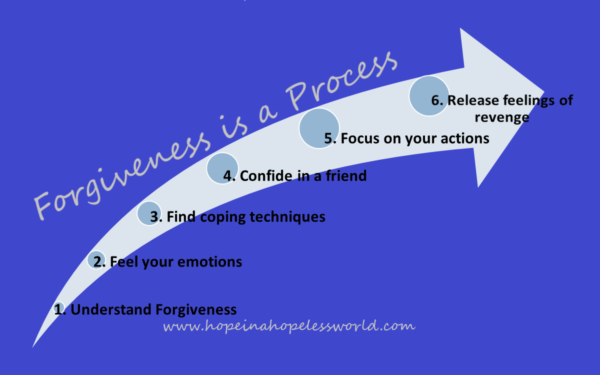Forgiveness is a Process
Forgiveness
After something painful happens there are natural emotions and physical reactions that occur. If we act on anger or ignore those reactions, we can make our pain worse. Forgiveness is for you, it’s not for anyone else. Forgiveness offers freedom and healing, so how do we get a place of forgiveness after something tragic?
Forgiveness is a process. A process that should not be rushed.
1.Understand Forgiveness.
Forgiveness often gets confused with other things. Forgiveness is not trust, reconciliation, or weakness. There are changes in your mind and heart that can lead to reconciliation and trust can be built over time. However, those are steps that can be sorted out with that person at a later time. Forgiveness takes great strength that comes from within. Understanding forgiveness is the first step in the process.
2.Feel your emotions.
Don’t rush into forgiveness. You were hurt and likely faced unfair circumstances that no one deserves. It’s never ok for someone to hurt you. Mourn your disappointments. Feel the anger, the heartbreak, and the sadness. Find ways to release the emotions in healthy ways. Don’t make life changing decisions during this time. Take a step back, retreat to safety, and process those emotions.
3.Find stress management and coping techniques.
While it’s important to allow time to feel our emotions, sometimes we can ruminate on events that happened. Replaying the pain over and over in our mind. When this happens, it can be important to distract your mind. Schedule time to feel and process and then stop. It might help to set a timer and vent to a friend and then choose a different activity after the timer is up. Or take out a journal and fill up a few pages and then go for a run, watch a movie, or something that will take your mind off the painful event. Find the stress management techniques that work best for you.
4.Confide in a friend.
It’s hard to carry a heavy burden all on your own. Find someone in your circle of friends or family that you can tell. Having someone else know the struggles you are facing, can help lighten the load. It’s amazing what talking it out can do.
5.Focus on your actions.
The actions of others are not within your control. Don’t wait for an apology or repentance. That’s their path to walk. We don’t have to let the people around us have control over our happiness. You get to choose forgiveness on your own terms.
6.Release feelings of revenge.
To forgive is to “stop feeling angry or resentful toward someone for an offense, flaw, or mistake.” Revenge or anger will not make you feel better. After you have actively worked at processing these emotions and allowed time to pass, release the anger. Redirect your mind to helpful, productive tasks. If anger continues to be a problem, seek help from someone that can help you work through the anger.
Author: Crystal
For more articles on Forgiveness, check out our Forgiveness Series.